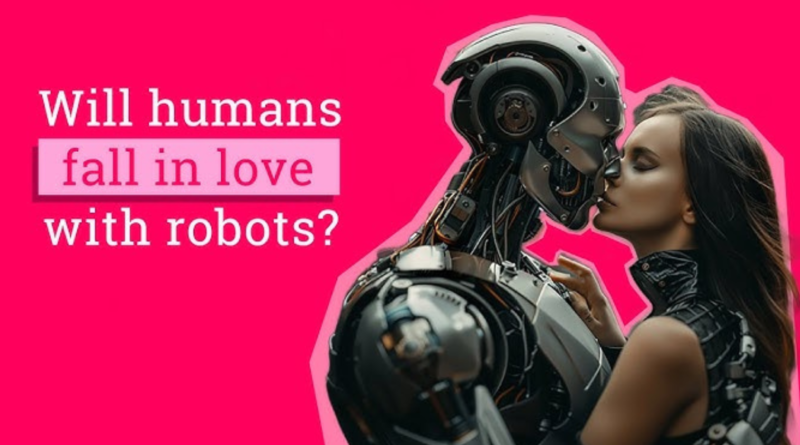CAN HUMANS FALL IN LOVE WITH ROBOTS?
Love has always been a deep and mysterious part of human life. People fall in love for many reasons-looks, personality, kindness, shared dreams, or even the way someone makes them feel safe. But in today’s world, where technology is growing so fast, a new question has started to appear: Can humans fall in love with robots?
This question may sound strange at first, but it is becoming more real with the rise of artificial intelligence (AI) and social robots. Robots are no longer just machines that clean floors or work in factories. Many are now built with human-like bodies, faces, and even voices. Some can talk, smile, and react to human emotions. So, it is natural to wonder if people can form romantic feelings for them.
Why Would Humans Love Robots?
Humans are emotional beings. We often look for connection, companionship, and care. Robots with AI can provide these things in some form. For example, a robot partner could:
Listen without judgment – A robot will never criticize or betray secrets.
Always be available – Unlike humans, robots do not get busy, tired, or distracted.
Be programmed to show affection – Some robots can say kind words, smile, or hug when needed.
Adapt to personal needs – Robots can learn what makes a person happy and repeat it.
For lonely people, elderly individuals, or those who have difficulty with relationships, this can feel like true love. The brain does not always separate whether kindness comes from a human or a machine. If a robot makes someone feel valued and cared for, emotions may naturally grow.
Examples in the Real World
This idea is not just imagination. In Japan, some people already “marry” virtual partners or AI characters. Companies sell humanoid robots that can hold conversations, sing songs, and even say “I love you.” In some countries, people buy robot dolls designed for companionship.
Movies like Her and Ex Machina also explore these themes, showing how humans might deeply connect with machines. Although these are stories, they reflect real questions society is facing.
The Psychology of Loving Robots
Love is partly about feelings and partly about imagination. Humans often project their emotions onto objects. For example, children talk to dolls as if they are alive. Adults sometimes give names to cars, phones, or pets and treat them like friends. If this can happen with simple objects, it is not surprising that robots-who can talk, smile, and interact-might attract stronger feelings.
The brain releases “love chemicals” like dopamine and oxytocin when someone feels cared for or touched. If a robot can trigger these responses through words, expressions, or gestures, a person may feel the same as they would with a human partner.
Can Robots Truly Love Back?
The biggest difference is that robots cannot truly “love” the way humans do. Robots can simulate emotions but they do not feel them. They do not have real desires, fears, or dreams. Everything they say or do is programmed or generated by AI.
So while a human might honestly fall in love with a robot, the robot’s “love” is only an imitation. This raises ethical questions. Is it healthy for people to fall in love with something that cannot truly care for them? Or is it still valuable because it brings comfort and happiness?
Benefits of Robot Love
Some experts believe that robot relationships can actually be positive in certain cases:
Reducing loneliness – Many people, especially the elderly or socially isolated, may find comfort in robot companionship.
Safe practice – People with anxiety or trauma may learn to trust again by first forming bonds with robots.
Support for mental health – Robots can provide constant encouragement, reminders, or emotional support.
Risks and Challenges
However, there are also concerns:
Emotional dependence – People may prefer robots over real human connections, leading to isolation.
Loss of social skills – If robots always agree and adapt, humans might struggle in real relationships where compromise is needed.
Ethical issues – Should companies profit from selling “robot love”? Is it fair to let someone believe a machine truly loves them?
Changing meaning of love – If love can be simulated by code, will society’s understanding of romance and marriage change?
The Future of Human-Robot Love
As AI becomes more advanced, robots will act even more human-like. They might remember details, share jokes, or show emotional support in ways that feel natural. Some people may form lifelong partnerships with them, while others may reject the idea completely.
In the end, love is not just about logic-it is about feelings. If a person feels loved and happy with a robot, it may be real for them, even if the robot is not truly alive.
Conclusion
So, can humans fall in love with robots? The answer is yes-humans already have, and more will in the future. But the deeper question is whether such love can replace human-to-human relationships. Robots may fill gaps of loneliness and provide comfort, but they cannot fully replace the richness of human emotions, growth, and imperfections.
Love with robots may not be the same as love between humans, but it shows how powerful human emotions are. Even when facing machines, our hearts can find ways to connect.




